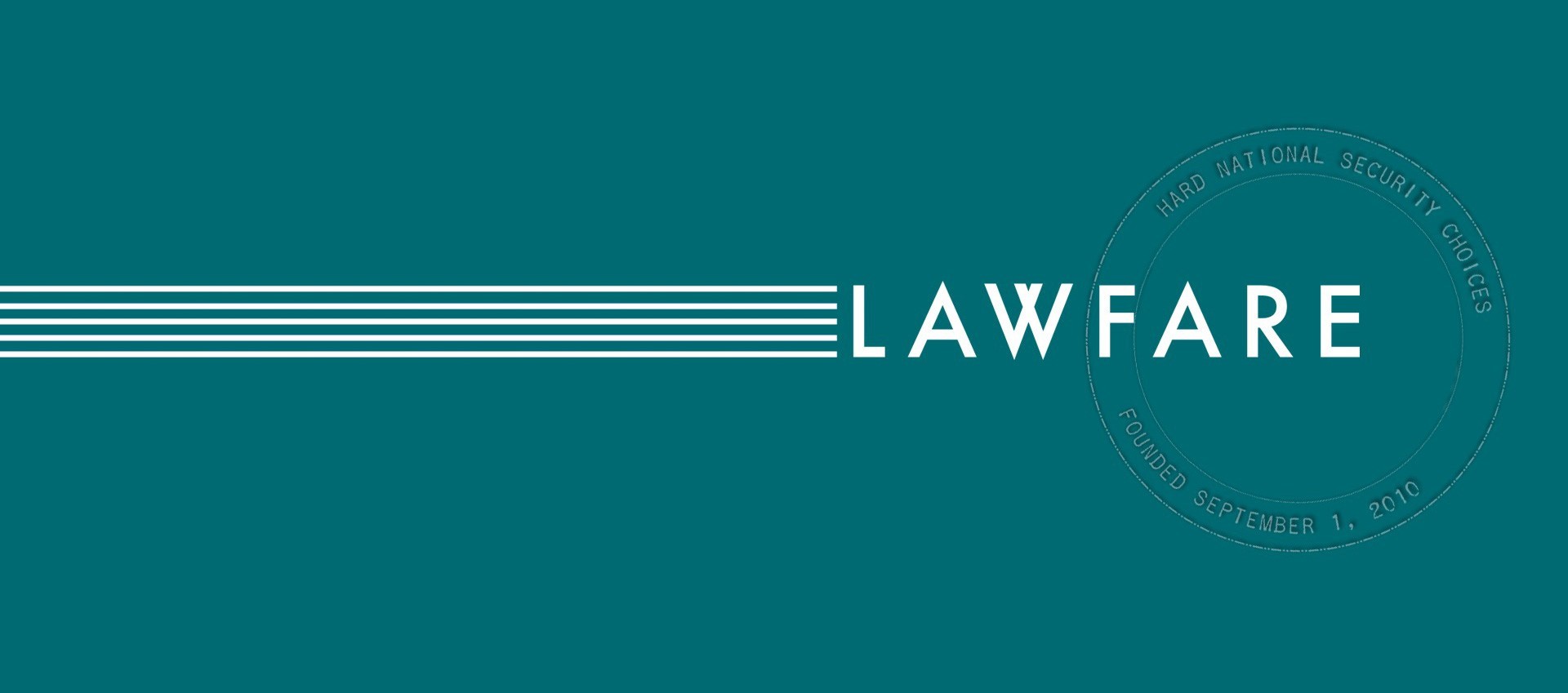The Week That Was: All of Lawfare in One Post
This week, let's start with the courts. Ben flagged the Second Circuit’s decision ordering that the government to release the legal memos that justify the targeted killing of Anwar Al Awlaki.
Published by The Lawfare Institute
in Cooperation With

This week, let's start with the courts. Ben flagged the Second Circuit’s decision ordering that the government to release the legal memos that justify the targeted killing of Anwar Al Awlaki. Jane followed up with a summary of the court’s reasoning, and then offered an analysis suggesting that the decision may end up being bad for transparency.
John analyzed Judge Scheindlin’s recent surprising decision in long-running apartheid litigation determining that corporations may, in fact, be sued under ATS. He argues that the decision is in pretty stark conflict with a Second Circuit panel's ruling, and that her decision will likely be reversed, and then appealed for an en banc hearing.
Ben noted the Supreme Court’s denial of cert in Hussain v Obama, and Justice Breyer’s statement on the same. He also congratulated Marty Lederman for calling this one.
And after the Supreme Court granted cert in Zivotofsky v. Clinton, Jack labeled the politically fraught case “potentially huge” for its implications on separation of powers.
In Guantanamo news, Wells kept up coverage of the al-Nashiri hearings, posting the prosecutor’s opening statements and keeping readers informed of motions asking for Judge Pohl’s recusal, for increased defense access to classified material, concerning the use of hearsay, on chain of custody, on the applicability of the death penalty, and on whether al-Nashiri can offer a reprisal defense. Later in the week, he passed the baton,to Matt Danzer who covered defense attempts to count out the death penalty, to win more in discovery, to sequester the jury and to send letters to the French government asking for investigative help, and more.
And in cyber news:
Paul observed that the SEC has begun to use the NIST Cybersecurity framework as a basis for regulation, and he commented on the irony of a similarly timed GAO report critiquing SEC for its own cybersecurity flaws. And in his latest Bits and Bytes post, he noted India’s attempt to challenge American web “hegemony” (by, among other things, renaming the internet) and a successful break-in of Anonymous members' computers by Israeli hackers. And in not-quite-cyber news, he noted that the Navy has gone to sea with a 3D printer.
Dan Geer of In-Q-Tel offered a more theoretical take on the lessons of heartbleed that is, frankly, beyond my ability to summarize. And Paul reflected on the relative insignificance of specific domain names and the much greater influence of search engines, hoping that the latter use that power for beneficent purposes.
For this week’s podcast, Ben interviewed former top CIA lawyer John Rizzo about his new book, the ongoing controversies over interrogation, and the growth of lawyering at the CIA. And in case that wasn’t enough, Ben followed up with lengthy (and largely laudatory) review of Rizzo’s book, Company Man.
Ben also posted an excellent Radiolab program telling the story of the creation and application of the AUMF, and featuring both Ben and John. And Bobby flagged a recent CSIS post by James Lewis setting the record straight about Russian intelligence authorities. Unsurprisingly, the facts are not quite as Putin said in his recent exchange with Edward Snowden.
And speaking of Putin: In this week’s Foreign Policy Essay, Raphael Cohen and Gabriel Scheinmann critique the Obama administration’s “naiveté” in foreign relations and argue that great power politics still dominate international affairs.
In this week’s Steptoe Cyberlaw podcast, the regulars were joined by Civil Liberties Protection Officer for the Office of the Director of National Intelligence Alex Joel. Together they discuss NSA matters and reform efforts and some of the cyber news of the past week.
Of course, no week at Lawfare is complete without plenty of NSA material.
So Ken flagged the lengthy public comment on the 702 program submitted by the NSA Civil Liberties and Privacy Office to PLCOB. Ben let us know of his and Dan Byman’s essay in Foreign Affairs on the future of NSA after Snowden.
Ben linked to a paper by MIT professor Catherine Tucker arguing that web users both in the US and abroad have become more cautious in what they will search on Google in the aftermath of the Snowden disclosures. And Carrie Cordero provided a recap of communications providers’ battle with USG over transparency, noting the substantial gains the communications providers achieved over the course of the saga.
Orin linked to a draft of his forthcoming article on how Fourth Amendment law ought apply to global internet surveillance and invited comments.
Paul gave us a Cassandra-like forecast about the future leadership of the House intelligence committee, predicting that political realities will lead to a leadership much more antagonistic toward the intelligence community. He also had some praise for DHS Secretary Jeh Johnson’s recent attempt to impose a coherent centralized management structure on the DHS bureaucracy. A “good luck” on that one from all of us here at Lawfare!
In response to a recent New York Times article by Mark Mazzetti, Joel Brenner concluded that “those who cannot distinguish between domestic criminality and urgently necessary foreign intelligence gathering … have lost their moral and political compass.”
And as the week drew to a close, Wells gave us the latest cache of declassified FISA Court materials---these an unsuccessful effort by an unnamed telecommunications company to stop the 215 program in light of a ruling in the district court ruling in Klayman.
And that is the week that was.
Yishai Schwartz is a third-year student at Yale Law School. Previously, he was an associate editor at Lawfare and a reporter-researcher for The New Republic. He holds a BA from Yale in philosophy and religious studies.





